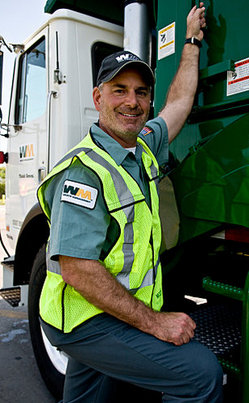Lent is a time of penitence and confession. So today, I want to begin with a confession: I love “Undercover Boss.”
This reality show debuted on CBS right after the Super Bowl. The premise is surprisingly simple: the CEO of a Fortune 500 company agrees to spend one week living and working as an entry-level employee in his own company. He changes his name, wears a disguise, and literally goes “undercover.”
 The first week, the man who did this was Larry O’Donnell, the head of Waste Management Inc., the largest waste disposal company in America. He makes a seven figure salary and lives in a beautiful home. But he gave that up for seven days, agreed to spend a week staying in a cheap motel, driving a garbage truck, emptying waste bins, and cleaning out portable toilets. As it turned out, he was terrible at it. He did such a bad job, he actually – for the first time in his life – got fired.
The first week, the man who did this was Larry O’Donnell, the head of Waste Management Inc., the largest waste disposal company in America. He makes a seven figure salary and lives in a beautiful home. But he gave that up for seven days, agreed to spend a week staying in a cheap motel, driving a garbage truck, emptying waste bins, and cleaning out portable toilets. As it turned out, he was terrible at it. He did such a bad job, he actually – for the first time in his life – got fired.
Last week, the main character was Coby Brooks, the President of Hooters, who worked as a dishwasher in Dallas, and stood on street corners in a tacky tee shirt to give out samples of chicken wings. He heard what people really think of his restaurants – and saw, in one shocking scene, how the waitresses are sometimes treated just as sex objects by management.
In both cases, the CEOs got to experience what their employees have to put up with – indignity, long hours, low pay, sexism. But they also got to share in the spirit that sustains these workers – optimism, faith, love of family. They saw the enthusiasm and sense of humor that some people bring to even the most menial jobs. The corporate leaders ultimately left their experiences changed.
In some ways, these are small stories of redemption and conversion – and not a bad fit, really, for the season we are just beginning, the season of Lent.
But I think there is another way of looking at this show – and I doubt it’s one that the creators imagined.
The story of an “undercover boss” — the story of a powerful leader lowering himself to menial work, and enduring all the struggles, hardship and pain that go with it — that story is also the story of something we celebrate every Sunday. It is the Incarnation. It is the reality of God becoming man. Sharing our sufferings. Bearing our burdens. Facing our trials. And knowing, as well, our hopes and joys. Jesus did all that – he was a man like us in all things but sin, Paul wrote – and we get a vivid example of it in today’s gospel.
Luke presents us with the story of Christ’s 40 days in the desert. It is more than a period of sacrifice. It is a time of testing – and temptation.
Luke describes three particular temptations – hunger, power and immortality. Face it: those are three of the most urgent desires any one know. And they go to the heart of who we are.
Hunger can be more than just a craving for a hamburger; there is the hunger for love, or for sex, or for attention. The human appetite is sometimes insatiable.
Power is about more than political ambition or world domination or celebrity; it is also about control, and independence -not being accountable to anyone, and being able to do what you want whenever you want, however you want. Last week, Tiger Woods acknowledged that this was part of his problem. He thought he had earned the right to do what he was doing.
And immortality is really about more than never dying. It’s about more than having the constant protection of angels. It is also about never feeling pain, or loss, or sickness, or sorrow.
Think of what the devil is offering: total satisfaction…absolute power…complete freedom. That would be irresistible to most of us. But not to Jesus. And for one startling reason: these are all things that would deprive Christ of his humanity. In saying “no” these temptations, and not giving in to them, Christ is saying “yes” to being one with us.
He is saying: I will know what it is like to be hungry, to crave something that I can’t have.
He is saying: I will know what it is like to want power, but to be powerless.
And he is saying: I will know what it is to hurt, and to bleed, and to die.
And so, as his earthly ministry unfolds, he will share our hardships and frustrations, our temptations and trials. He will feel what it is like to be denied, and betrayed. He will know every kind of person. He’ll know Judas – and St. John, the beloved disciple. He’ll meet the woman at the well, and Mary and Martha. He will know our dreams, and the things that sustain us. He will see all that we are – the good, the bad, and the ugly.
He will be the ultimate “Undercover Boss.”
As we begin our journey through Lent, Luke’s gospel reminds us: we do not go into the desert alone. We go with Christ. He knows what we are living with, and living without. So, turn to him in moments of temptation or need. Take his hand. Receive his strength. Look into his eyes, the eyes that have shed tears, and blinked away sweat. Ask for his help. He is God – but he is also us.
And we do not go into the desert of Lent alone.
This afternoon, our RCIA candidates will also be heading out on a journey – and they won’t be alone, either. They are going to take part in the Rite of Sending and Rite of Election, joining hundreds of others from around the diocese, to continue their walk in faith. They will all move closer to receiving their sacraments. And they will carry with them all our prayers, our hopes, our joy, as we eagerly await the day when they can join us at the table of the Lord.
I know this journey for you candidates isn’t always easy. And I know there are temptations to just give up. But remember one of the beautiful messages of today’s gospel: Christ was also tempted. And in the days ahead, his understanding, his love, his grace will make what seems impossible…possible.
Because none of us goes into the desert alone.
The Boss is with us.

